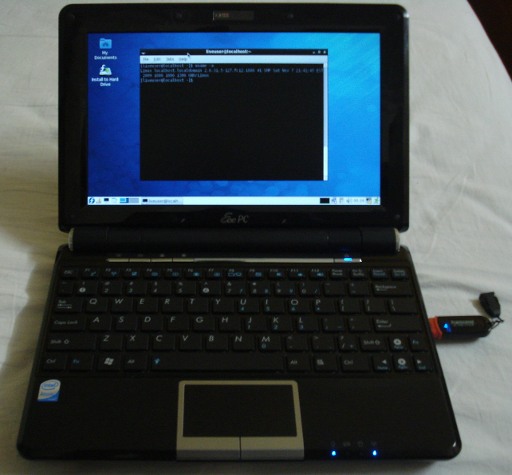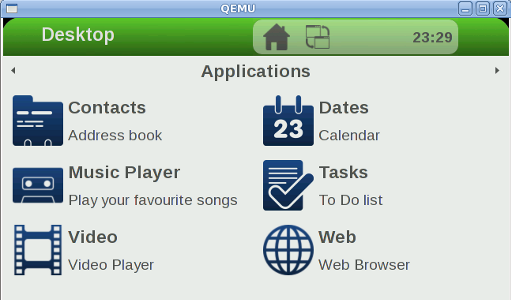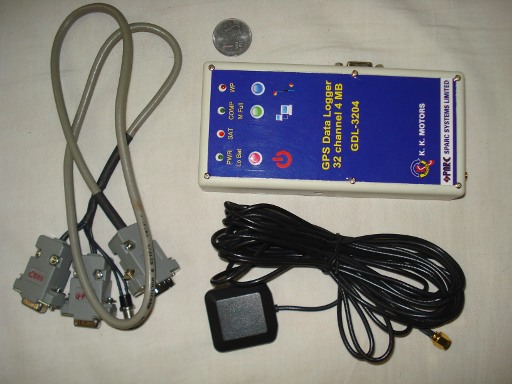


More photos available in my /gallery.
We will be initiating olpc, Hyderabad for content creation (Telugu) and to support the students, faculty and staff at KMRF who need assistance. Thanks to my good friend, Dr. Sameer Verma for coordinating with me last few months in this regard. Prof. Humaira Mahi will be having a field deployment through KMR Foundation. Please do write to me if you are interested in helping them in Hyderabad.
Digital Gate Compiler (DGC) was written by Oliver Kraus in 2003, who is not with Universität Erlangen-Nürnberg anymore. The current maintainer of the project is Tobias Dichtl. His line of scientific research is not the same as that of DGC, but, he said he will be adding “extended burst mode synthesis support” this year. Meanwhile, I had updated the sources with autotools build changes, and released 0.98 for Fedora. The updated changes are available at dgc.git Fedora Hosted repository.
Installed livecd-tools, used livecd-iso-to-disk to write F12 LXDE spin to a USB disk, and used it to boot a Asus EEE PC:
# yum install livecd-tools .
.
I had conducted a one-day Fedora, Free Software workshop at the Bachelor of Computer Applications department, Maharaja Sayajirao University of Baroda (Vadodara), Gujarat, India on Saturday, December 26, 2009.

Thanks to VGLUG for coordinating with me for the past few months in organizing this event. I would like to thank the Fedora project for sponsoring the travel.
The BCA department lab systems were equipped to run on Fedora 12, and we used it for couple of the hands-on sessions:
I had also addressed the following topics:

Participants were from the BCA department, and had also come from Ahmedabad. Vadodara (Baroda) connects to Ahmedabad via 95 km National Expressway 1.
Free/Open Source Software is officially included in the Gujarat state school syllabus for higher secondary (XI and XII). In the coming years it is expected to be even introduced from standard VIII.
The Department coordinator and Professor V A Kalamkar is happy to facilitate work between VGLUG, and the students for Free/Open Source Software projects. We hope to have more interaction with them in the future.
VGLUG members are also keen on participating in the Fedora project at various sub-projects of their interests.
Due to the political crisis in Hyderabad, I was uncertain about reaching the Hyderabad airport, and thus making it to the workshop. The bandh was withdrawn for December 25th, and when I made it the airport on the 25th, the scheduled flight was cancelled. So, I had to re-schedule a different flight, but, the airline officials said they couldn’t guarantee if I will make it to my connecting flight in Mumbai. This re-scheduled flight got delayed even further. Luckily, my connecting flight also got delayed, and I finally managed to make it to Vadodara.
As customary, here are some photos taken during the trip.
Pushed poky-scripts to Fedora repository. Poky is a platform builder tool written in Python that allows you to build toolchains, kernels, rootfs images for different target hardware. Use:
# yum install poky-scriptsYou can test run pre-built images, for example from Pinky (3.1.x) releases:
$ poky-qemu zImage-2.6.23-pinky-3.1-qemuarm.bin poky-image-sdk-qemuarm-pinky-3.1.rootfs.ext2
If you want to build your complete environment, you need to download the latest Poky stable release 3.2.x ‘Purple’ (latest) and extract it to ~/devel. Make sure you have a broadband connection and atleast 3G of disk space as the scripts will fetch, build everything from toolchains, kernels, user space applications. Follow the Poky handbook which is very well documented. Supported reference platforms include (to mention a few):
Downloaded Fedora 12 (i386) mirror using FedX, written by Ratnadeep Debnath and myself. I have updated it to rsync from a mirror to a local copy as well as from an external disk to a local directory.
$ git clone git://gitorious.org/fedx/mainline.gitI assume that this drastic size reduction is due to the switch from gzip compression to XZ (LZMA format). Please refer XZRpmPayloads (when the site is back up and running). This Fedora offline repository is very handy when working offline, or when it is required to install packages when using slow Internet connectivity speeds.
Bought the GDL3204 GPS data logger from Sparc Systems Ltd, Mumbai, India for INR 7500 (taxes and shipping charges additional). They use gEDA (GPL Electronic Design Automation) and Printed Circuit Board (PCB) for their work, and I thought I should support them by buying a unit.

It has a serial interface to connect to a computer, and can store 74000 track points on a 4MB non-volatile memory. It can be used for openstreetmap work. You can use the sparcy (command line tool) with it from Fedora.
~~~~ {.shell} # yum install sparcy ~~~~We approach technical advisor X and assistant professor Y for a F/OSS unconference at a premier International Institute, and they never respond for weeks. Apparently, we knew the Head of the Institute, who whole-heartedly agrees, having been a user group member during his college years, and asks X and Y to take things further.
Now, X and Y are upset, because we approached the Head of the Institute, and permission was granted. Then X and Y show off their ego, presence, and reciprocate by not communicating at all our requests. Weeks go by, and we still don’t get any prompt response. And we decide to finally call it off with them because it was not helping us progress any further.
End result is that the students/faculty of the Institute are at a big loss for not having the event at their venue for no fault of theirs!
While, I have seen such extreme ego cases in India in most of my attempts to organize Free Software unconferences, I have never shared it with others. Maybe I should write a book – The Adventures of Shakthimaan: The “Lost” Chronicles :)